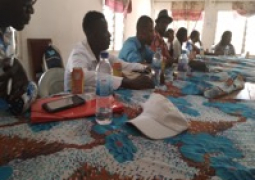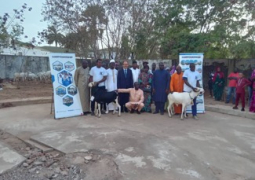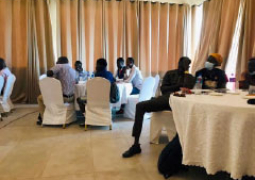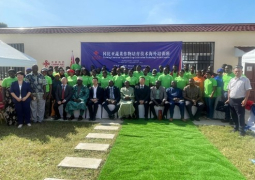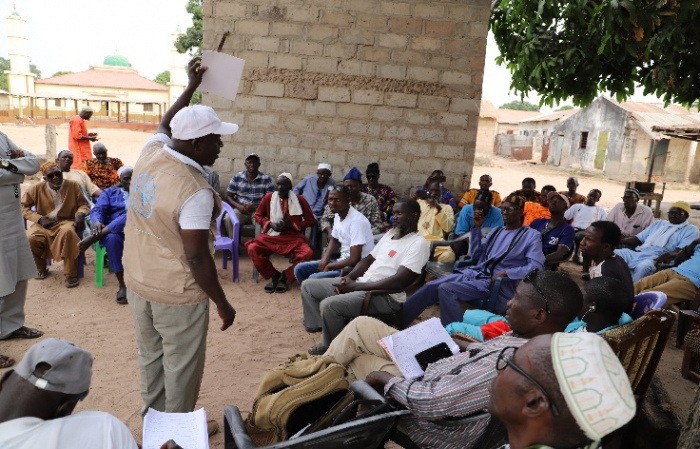
The consultation was conducted to address the challenges related to the sustainability of agricultural intervention projects in The Gambia. Most projects tend to thrive well during their implementation stages but once they are handed over to the beneficiaries, issues related to poor management and lack of full ownership are often reported.
The community consultations were held under the Adapting Agriculture to Climate Change Project (AACCP). The Global Environment Facility (GEF)-funded project aims to promote sustainable and diversified livelihood strategies for reducing the impacts of climate variability and change in the agriculture and livestock sector. The project is being implemented in ten communities in the North Bank Region (NBR), Central River Region North (CRR/N) and Upper River Region (URR).
One of the activities under the project is to improve the management of rangelands and increase access to livelihood assets and sustainable sources of income by livestock dependent communities. To this end, the project is providing ten livestock watering points. It is also creating stock routes to increase cattle’s access to drinking and grazing areas as well as starting Intensive Feed Gardens for livestock to feed during the dry season.
The project has so far demarcated stock routes (cattle tracks) in seven communities and the establishment of ten (10) cattle drinking points (boreholes) is ongoing. To help manage and sustain these community shared livestock infrastructures, and other shared natural resources, FAO in partnership with the Department of Livestock Services (DLS) conducted community consultation to help establish local conventions. The purpose of the local conventions is to serve as a guide for the sustainable management of shared livestock and agriculture resources.
The Consultation Process
Officials of the Department of Livestock Services (DLS) and the National Livestock Owners Association (NaLOA) led the consultation process. It was carried out in series at clusters in the intervention communities. The ten clusters include 112 communities.
Three representatives from each of the beneficiary villages take part in the consultation process. They include the village Alkalo, the Village Development Committee (VDC) chairperson and its secretary. The discussions focus on three thematic areas of livestock, forestry and crop production. They discuss problems associated with each of these and proffer solutions that would be developed and adopted as a local convention.
“This extensive consultation process has helped us learn important lessons while also providing guidance and solutions to the main challenges faced by beneficiaries,” FAO Representative, Moshibudi Rampedi said. “It has also helped us take the right actions to ensure continuity of interventions and improve management of projects so that our beneficiaries continue to reap the benefits of healthy livestock and agricultural resources.”
Challenges Identified
Amongst the difficulties farmers highlighted are the limitations in the seasonal productivity of the natural grasslands, poor biomass yield and low level of rangeland management. They also complained of acute water shortage during the long dry season, which compel Gambian herds to migrate to Southern Senegal in search of water during those seasons. The farmers also noted that bush fires and deforestation cause feed shortages during the dry season. They noted that most farmers send their animals on transhumance into the Senegalese Casamance
area. Another challenge they highlighted is the encroachment on cattle tracts for settlement and farming activities that often result in conflict between farmers and livestock owners.
Solutions
The farmers agreed that drilling boreholes would mitigate water shortages and enhance the utilisation of grazing areas within their areas. They agreed to set up water user committees to manage and sustain community-shared livestock watering points and natural resources. Regarding frequent bush fires, the farmers suggested levying charges on culprits of bush fires. They also implored the Department of Forestry for strict enforcement of bush fire regulations. A solution to the encroachment on cattle tracts is to identify grazing lands, and use concrete pillars to mark cattle tracts.
The problems that the farmers discussed and the measures they proposed will be compiled and developed into local conventions to better manage and sustain community-shared resources such as cattle drinking points (boreholes) grazing areas, community forests and cattle tracts.
Participants in the consultation expressed delight at taking part in the process and thanked FAO for intervening to improve the welfare of their animals. “The community consultation for the development of a local convention on how to manage our shared natural resource and livestock infrastructure is very beneficial. We have a responsibility to care for animals and conventions of this kind help ensure that animals are adequately cared for within our communities. I commend FAO and the government for this good initiative and involving us to promote local ownership”, Mamalang Jammeh of Sittanunku said.


